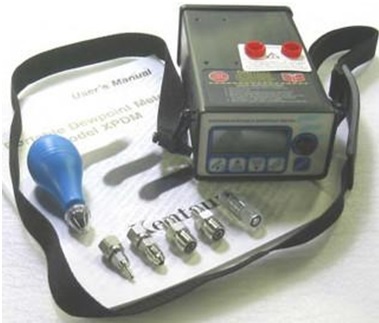Dew Point Meters' Advantages in Various Applicatio…
Posted by AVP on Nov 30th 2022
Have you ever had a faulty compressed air dryer system ruin your production output, and you didn't realize it until it was too late to fix it? Dry compressed air is a very important quality when it comes to making sure a process is safe.
In compressed air systems, dew point meters are used to keep an eye on the quality of the air used in manufacturing. Keeping the air quality stable is important for a number of reasons, such as making sure expensive equipment is safe and meeting government standards for air quality checks.
A dew point meter is a tool that measures the amount of water vapor in the air by figuring out the temperature at which water starts to condense at a certain barometric pressure. Even though the dew point is more often talked about in weather reports, it is a key factor that affects many industrial processes.
The materials and product themselves can both suffer from too much moisture. In this article, we'll talk about how useful dew point measurement equipment is and why you should use it in your process.
Advantages of Dew Point Monitoring
Moisture can get through almost any material, change test results, lower product quality, cause corrosion in pipes, cause ice to form at low temperatures, speed up wear and tear, and even cause machines to break down.
The following are some of the advantages that come with monitoring the dew point of a process gas:
Equipment Protection and Process Security
High humidity levels in piping systems for a long time can cause corrosion, a drop in the quality of the equipment, leaks, and even explosions. Pipes could freeze and burst in extremely cold temperatures. Moisture control helps prevent injuries and saves money on unanticipated repairs.
Quality
Condensation in pressurized air can cause pipes and machines to get clogged, pollute the environment, break down, or freeze. Modern places that use compressed air may be able to find and fix these problems with the help of dew point monitoring tools.
Having clean, dry air on packaging lines is crucial for the safety and integrity of food and beverage products. In the case of filling packs of perishable foods with a filling gas, for instance, you don't want anything that isn't meant to be there.
Humid air condenses into water droplets when air pressure is applied, which can result in rust, which then gets into the finished product.
Reduced Energy Use
Energy-saving options, on the other hand, may be found just about anywhere; all it takes is a bit of diligence on your part. The best way to make sure compressed air systems use less energy and cost less to maintain is to measure the dew point.
Since clean, dry compressed air is so important to every industrial process or plant and costs a lot, it is a must to keep it in good shape and keep an eye on it. Reliable dew point measuring tools can help you avoid over-drying, save energy, and prevent corrosion on your equipment.
Typical Applications for Monitoring Dew Point
There are a number of uses for dew point meters, many of which involve situations in which a constant humidity level is required. For example, they can be installed aboard ships to safeguard the cargo from being ruined.
Also, they can be used in a wide range of situations where preventing condensation damage to equipment or controlling humidity levels in the air is important for industrial work.
- Most rules about medical gases and breathing air require that the dew point is being monitored. Operating rooms frequently employ dry, sterilized air, and pneumatically powered working instruments are the primary consumers of this material as they are simpler to sterilize than their electrically operated counterparts.
- Compressed air is used in a number of applications in the food and pharmaceutical industries; hence, both of these sectors make extensive use of compressors. Drying and monitoring the quality of the coating, filling, and packing are just some examples of typical applications.
- In an industrial setting, compressed air systems protect compressed air lines from corrosion and icing. This keeps pneumatic equipment running smoothly.
- To make sure that brake, door, and air conditioning systems on trains and buses continue to work and keep people safe, the dew point of the compressed air they use is measured.
- Large vessels, such as those used in boilers, cargo, liquified gas carriers, etc. are typically put through a series of hydraulic tests to ensure they leak- and pressure-free. After that, they need to be dried so that they don't rust, which is typically done by blowing warm, dry air over them. At the beginning of the drying process, there is no need to monitor the exhaust air because it is extremely moist. At the completion of the drying process—which could take several days—the exhaust humidity must be determined.
COSA Xentaur Dew Point Meters

The dew point and the amount of moisture in a product have significant impacts on its freshness, durability, cost, and processing potential. Here at Air & Vacuum Process Inc., we have COSA moisture analyzers, which are user-friendly and effective tools for quality control, manufacturing, and in-process control in a wide variety of sectors, including the pharma, biochemical, plastic materials, and food and beverage sectors. These multifunctional dew point meters have a straightforward user interface, are quick and accurate and require minimal upkeep.
Altec Air Moisture Indicators
By providing a visible indication of the moisture content of the output air stream, moisture indicators from Altec AIR offer a low-cost method of keeping an eye on a dry compressed air system. We recommend installing these moisture indicators either on the dryer output or after the air dryer. Using them to keep an eye on your dry compressed air system won't break the bank, and they're very simple to set up.
Altec High-Humidity Alarm
After a regenerative desiccant dryer is set up, these electronic humidity detectors are set up. When they detect moisture in the air, a red warning light and dry contactor closure signal are sent to the user. Dry-contact alarm signals can be wired to sound a horn or siren, so they can be seen from a long way away.
How about some expert guidance on how to monitor humidity or residual moisture in your process? Call us at 866-660-0208 if you need assistance.
